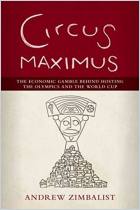Join getAbstract to access the summary!

Join getAbstract to access the summary!
Olympic Committee
Less, Better and for Longer
Five Ways Paris 2024 Is Delivering More Sustainable Games
International Olympic Committee, 2024
What's inside?
Expect a friendlier Olympics this summer.
Recommendation
Even before the 2024 Summer Olympics opened in Paris, organizers shared their goal of staging a conscientious, restrained event that meets environmental expectations and leaves little waste behind. This article, which the International Olympic Committee (IOC) published to celebrate Earth Day 2024, smashes a negative presumption about previous host cities and outlines lessons for future host cities. The IOC proposes a strategy that respects the global call for responsibility, sustainability, and inclusivity. It hopes that Paris 2024 can provide a blueprint for smarter, more environmentally savvy Olympic Games.
Summary
About the Author
The International Olympic Committee is the guardian of the Olympic Games and the leader of the Olympic Movement. It collaborates with all Olympic stakeholders, including the athletes, the National Olympic Committees, the International Federations, the Organizing Committees for the Olympic Games, the Worldwide Olympic Partners, media rights holders, and public and private authorities, such as the United Nations.






















Comment on this summary